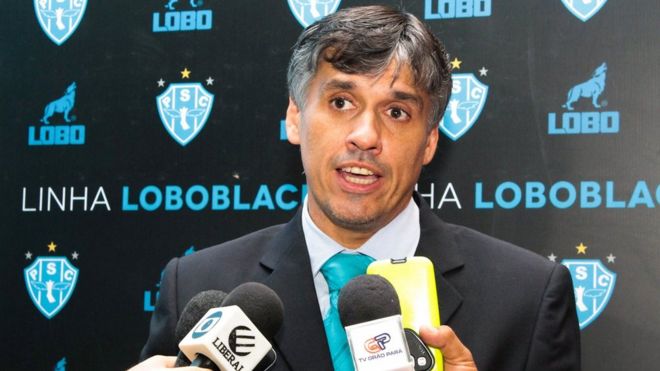
The president of a Brazilian second division football club, Paysandu Sport, has resigned, saying armed men had threatened to kill him if the club was relegated.
Sergio Serra said he had been approached while out walking with his family by men on motorcycles.
Paysandu is based in Belem and is one of northern Brazil’s biggest clubs.
The club has fallen on hard times and is in sixteenth place in Serie B, just one place away from relegation.
Christina Serra, Sergio’s sister, reported on social media that her brother had been out on Sunday evening with his wife and children.
“One of them, his face covered with a shirt, said, ‘I know where you live. If Paysandu go down to to Serie C, I’ll end you, and your wife and that crazy son.’
“My brother was very shaken and took the only decision possible under the circumstances to resign.”
Brazilian football has been struggling to deal with an increasingly violent football fan base for decades and players have also received threats.
In 2011, the veteran left-back, Roberto Carlos said he had received threatening phone calls and people had followed his car on motorcycles after his football club, Corinthians, was eliminated from the Copa Libertadores.
Three years later, in 2014, Brazil national striker, Fred, said a group of fans had swarmed his car after practice complaining about the team’s recent games and demanding a better result.
Fred said he had to dangerously accelerate to escape and nearly caused an accident.
Organised football fan clubs have also been blamed for organising regular fighting after matches with rival groups, which often result in severe injuries and in some cases, deaths.
In February of this year, a football fan was killed and seven more injured as supporters of rival teams Botafogo and Flamengo clashed in Rio de Janeiro.
Some of the clubs have been connected to drug trafficking, extortion and money laundering.
Two years ago eight Corinthians supporters who belonged to one of the fan clubs, Pavilhao Nove, were each shot in the head while preparing banners ahead of a game.
Police said the killings were likely to be connected to a drug dispute in Sao Paulo involving Primeiro Comando da Capital (PCC), Brazil’s largest criminal organisation.
BBC



